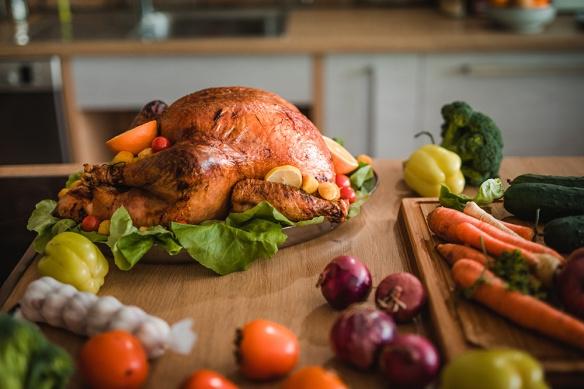Healthy Eating Tips For Seniors This Holiday

With Thanksgiving around the corner, your mind may be set on catching up with family over glasses of wine and expansive dinner menus, followed by days of overeating with frequent naps on the couch. Holidays take a toll on your gut and staying healthy can be a challenge throughout the fall and winter – especially for seniors.
On Thanksgiving, the average American consumes over 4,500 calories and 229 grams of fat between snacks, drinks and dinner. How can you fight temptations and avoid overdoing it during the holidays? We’ve prepared these HEALTH tips for seniors to stay on track.
Hydrate … with water – It’s OK to have an alcoholic beverage or two during the holidays, but drink in moderation. Drinking water is essential to keeping your digestive system moving and avoiding dehydration. Drinking small amounts of fluids, with limited sugars and salts, throughout the day will help flush out toxins and cleanse the body faster than any other beverage. Water can also help you stop overeating by making you feel full faster.
Eat as normal as possible – Try and eat close to your normal times to maintain regularity. Don’t skip meals to save up for a feast. Remember, your plate should look like a rainbow with lean protein, fruits and vegetables, whole grains and low-fat dairy. Don’t fall into the common carb trap. Biscuits, corn bread and potatoes are heavy foods that will fill you up and can cause inflammation of joints and muscles.
Avoid sodium-loaded dishes – Substituting salt with fresh herbs and flavored vinegars is a great alternative to sodium-heavy condiments and seasonings. Using low-sodium broths when cooking is another easy switch. Increased age often comes with increased salt sensitivity. Older adults should generally aim for 1,500 mg of sodium each day to avoid high blood pressure, cardiovascular disease and risk of stroke and heart attack.
Limit your “no-no” foods – It’s easy to overindulge in all the starch, sugar and alcohol loaded options at the table. The good news is your dishes don’t have to be packed with sugar, salt and fat to taste good. Reducing sugar by half and supplementing the sweetness with citrus, vanilla, cinnamon or nutmeg can be an effective and healthier best practice. When baking, try using unsweetened applesauce or mashed bananas as a substitute for fatty ingredients. If someone else is cooking, bring a dish you love and know has ingredients you can eat.
Take a walk – With travel disrupting your daily routines, it can be hard to stay active. Keep moving – it will help make up for eating more than usual and reduce stress. Breaking physical activity into smaller chunks so it fits into your schedule better is helpful. It is recommended that older adults get at least two hours and 30 minutes of moderate-intensity aerobic activity every week and muscle strengthening activities on two or more days a week.
Healthy portion sizes – Portion control is key this holiday season. Eat until you’re satisfied, not stuffed. Overeating can cause stomach distress and a number of gut-related issues. Eating small portions helps reduce calories while still being able to taste all the dishes. If you really need to taste both pies, take a tiny slice of each instead of a full serving.
Looking for a healthy side dish this Thanksgiving? Executive Chef Anthony Napolitano shared his delicious Honey Balsamic Roasted Brussels Sprouts recipe with us. Enjoy!